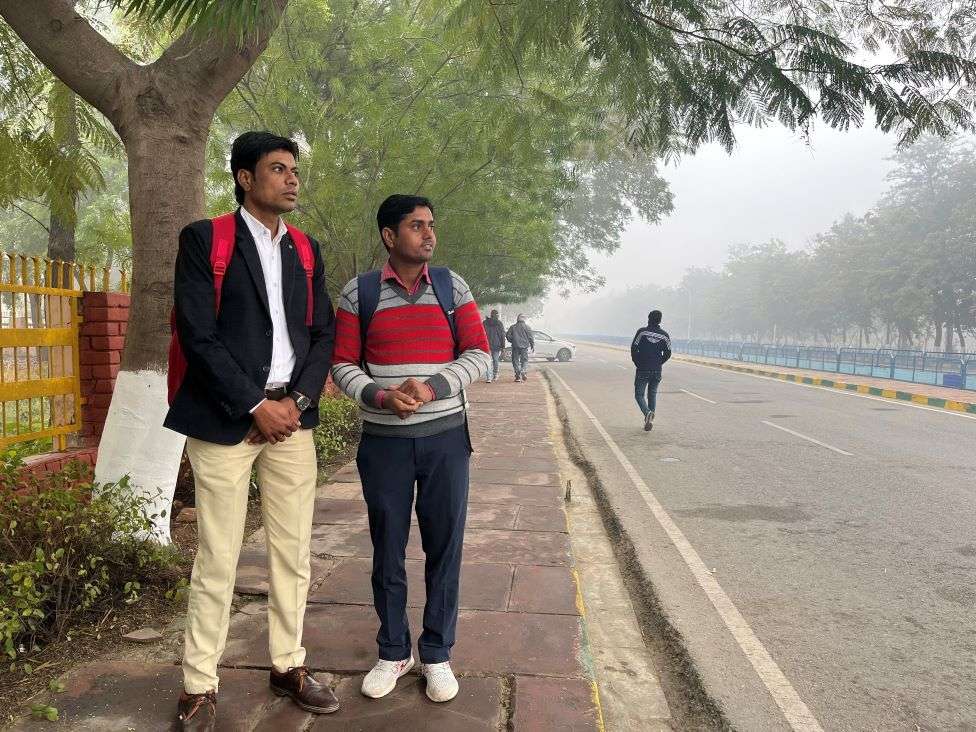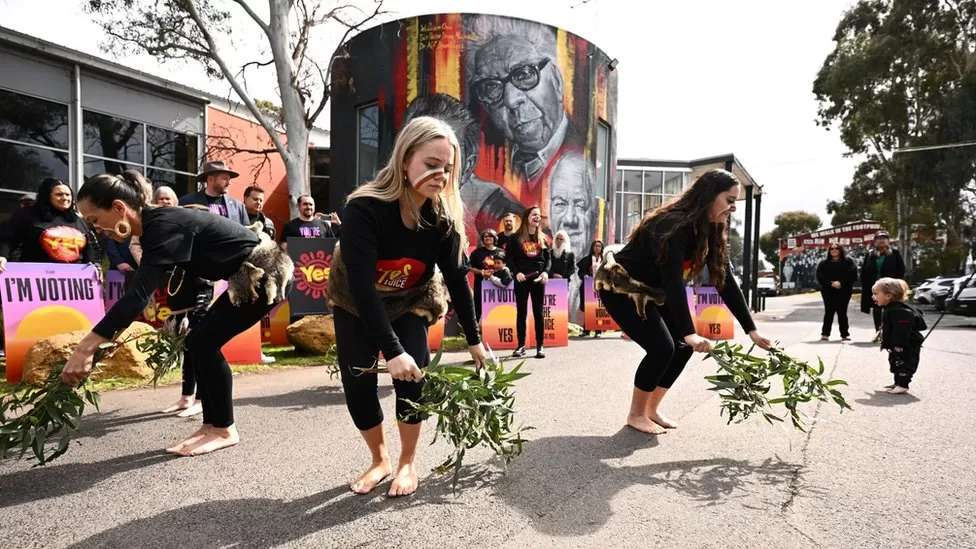On a frigid morning last week, hundreds of men, wrapped up in woollens and blankets, queued up inside a sprawling university campus in India's northern state of Haryana.
The men, carrying backpacks and lunch bags, were queueing up for practical exams for construction jobs - plastering workers, steel fixers, tile setters - in Israel.
For those like Ranjeet Kumar - a university educated, qualified teacher who has only ever managed to find work casually as a painter, steel fixer, labourer, automobile workshop technician, and a surveyor for a non-profit - it is a chance too good to pass up.
The 31-year-old has never managed to earn more than 700 rupees per day, despite having two degrees and having cleared a government "trade test" to work as a "diesel mechanic". In contrast, the jobs in Israel are paying around 137,000 rupees ($1,648; £1,296) a month, along with accommodation and medical benefits.
Perhaps unsurprisingly then, Mr Kumar, who got a passport last year, is eager to secure a job as a steel fixer in Israel to support his seven-member family.
"There are no secure jobs here. Prices are going up. I am not financially stable even after graduating nine years ago," he said.
According to reports quoting officials, Israel plans to bring in 70,000 workers from China and India and other countries to boost its construction sector, which has been struggling since the 7 October Hamas attack. A labour shortage had arisen after Israel barred some 80,000 Palestinian workers following the attack, reports add.
Some 10,000 workers from India will reportedly be hired. Uttar Pradesh and Haryana are accepting job applications, with the Maharshi Dayanand University in Haryana's Rohtak city hosting tests for a few thousand applicants from across the country. (The Israeli embassy in Delhi refused to comment on the subject.)
Like Mr Kumar, the job seekers in the queue are part of India's sprawling and precarious informal economy, working without formal contracts and benefits. Like Mr Kumar, many hold college degrees but are struggling to land secure jobs, and find themselves in casual construction jobs, earning up to 700 rupees a day for about 15-20 days a month. They carried their resumes - "I am a good team player with my team," said one.
Many juggle multiple jobs to augment earnings. Some attribute their financial setbacks and limited prospects to India's 2016 currency ban - or demonetisation - and the strict 2020 Covid lockdown. Others complain about question paper leaks in government exams. Many claim to have tried to pay agents to illegally enter the US and Canada but found it difficult to gather the money. All this, they said, had prompted them to look for a secure, more lucrative overseas job, "never mind the risk of working in a war zone".
Sanjay Verma, who also graduated in 2014, obtained a technical education diploma, and spent six years attempting over a dozen government exams for positions in the police, paramilitary and railways. ("There are very few jobs, and the demand is 20 times their number," he said). In 2017, he failed to pay up 140,000 rupees to an agent for a promised 900 euro-per-month farm job in Italy.
Parbat Singh Chauhan said he had slipped back into uncertainty after the twin shocks of the currency ban and the pandemic lockdown. The 35-year-old from Rajasthan worked as a emergency ambulance driver, earning 8,000 rupees a month for a 12-hour daily job. He also undertook small construction contracts in his village, and even bought six cars for taxi rentals.
Mr Chauhan, like many others, commenced his journey after completing high school. He began as a newspaper hawker in school, earning 300 rupees a month. After his mother died, he worked in a clothes shop. When he didn't find a decent job, he did a course in repairing mobile phones. "But that didn't help much," he said.
For five to seven years until 2016, his fortunes improved: he drove an ambulance, managed small village construction contracts and ran his fleet of taxis.
"But the lockdown [in 2020] destroyed me. I had to sell my cars as I couldn't afford the mortgage. Now I am back to driving an ambulance and taking small government construction contracts," he said.
There are others like Ram Avatar, a 40-year-old tile setter from Haryana with two decades of experience. Faced with the challenges of a rising cost of living and stagnant wages, he worries about funding the higher education of his children - his daughter is pursuing a bachelor's in science, while his son aspires to become a chartered accountant. He tried for jobs in Dubai, Italy, and Canada but couldn't afford the exorbitant fees demanded by agents. With expenses for rent, his children's coaching, and food, he says he's struggling.
"We know there's a war going on in Israel. I am not afraid of death. We can die here too," he said.
Then there's the rising tide of aspiration. Harsh Jat, 28, earned a humanities degree in 2018. Initially a mechanic in a car factory, he later spent two years as a police vehicle driver, growing weary of dealing with "intoxicated people misusing the emergency line". Subsequently, he worked as a pub bouncer in the upscale suburb of Gurgaon, earning 40,000 rupees. "These jobs, they throw you out after two years and there's no security," he told me.
Mr Jat, jobless, returned to his family's eight-acre farm. "But nobody wants to farm now," he said. He tried government jobs - clerk, policeman - without success. He said young men in his village have paid agents 6m rupees each to illegally enter US and Canada. They were sending remittances home, funding their families' acquisition of fancy cars.
"I want to go abroad and get a good, well-paying job because when I have a child he will ask me, 'why does my neighbour have a swanky SUV, and we don't'?" said Mr Jat.
"I am not scared of the war."
The jobs scene in India presents a mixed picture. Government data from its Periodic Labour Force Survey, shows a declining trend in joblessness - from 6% in 2017-2018 to 4% in 2021-2022. Santosh Mehrotra, a development economist and visiting professor at the University of Bath, attributes this to the inclusion of unpaid work as jobs in government data.
"It's not that jobs are not happening. It's just that organised jobs are barely growing and at the same time, the number of young people looking for jobs is increasing," said Prof Mehrotra.
Unemployment is falling but remains high, according to the latest State of Working India report, by Azim Premji University. After stagnating since the 1980s, the share of workers with regular wages or salaried work had begun increasing in 2004 - 18 to 25% for men and 10 to 25% for women, according to the report. Since 2019, however, the pace of regular wage jobs had decreased due to a "growth slowdown and the pandemic".
The report found that above 15% of graduates - and a massive 42% for graduates under 25 years old - had no jobs in the country after the pandemic. "This group has aspirations for higher incomes, and they don't want to do insecure gig work. This group is trading that extreme risk [of going to Israel] for higher incomes and some level of reduced precarity," said Rosa Abraham, a labour economist with Azim Premji University.
One of them is Ankit Upadhyay from Uttar Pradesh. He said he paid an agent, got a visa and spent eight years in Kuwait working as a steel fixer before losing his job during the pandemic.
"I have no fear left. I want to work in Israel. I don't mind the risks there. There's no job security at home," he said.








